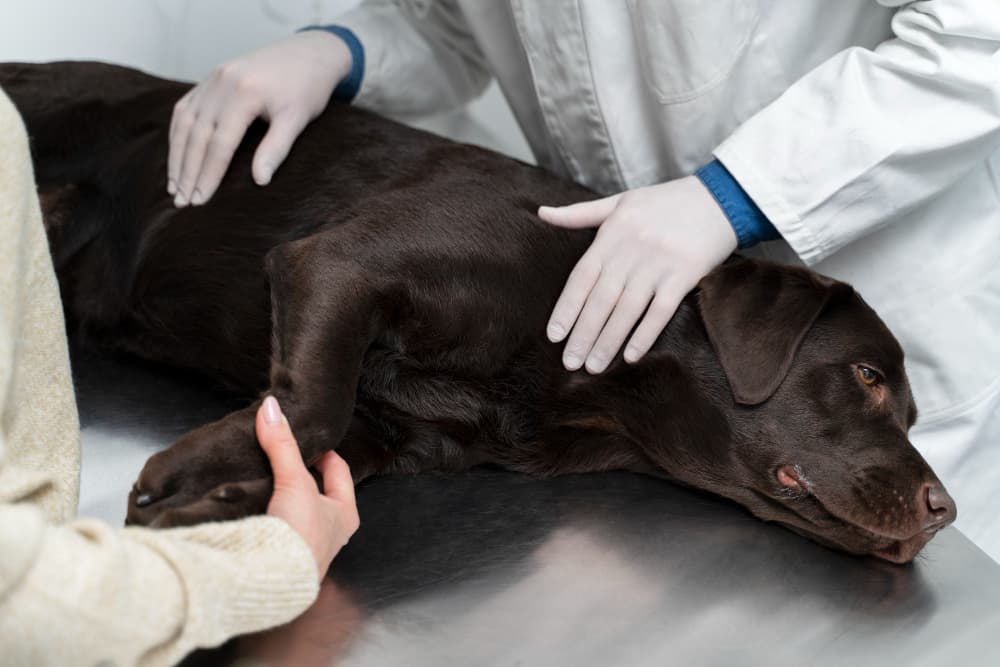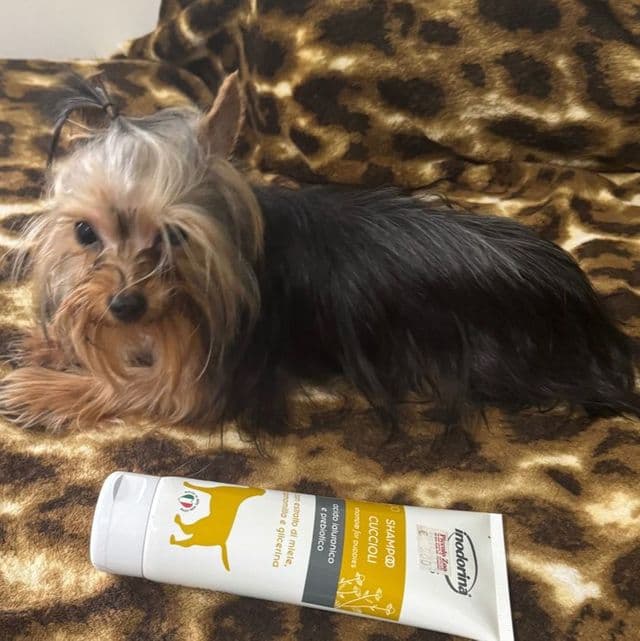How to Treat Chronic Diarrhea in Dogs (Veterinary Guide)
By Amelia Baker · 5 minutes read
Last updated: July 9th, 2025

Chronic diarrhea in dogs is not merely a frustrating sign; it's a hidden clinical sign. In the eyes of veterinarians, the cause of recurring or intermittent diarrhea is usually a diagnostic puzzle, particularly when healthy dogs are the clients.
From parasitism and dietary disorders to systemic disease and immune-mediated enteropathies, canine chronic diarrhea needs to be diagnosed and treated. This in-depth article offers insight into how to address a common yet often frustrating condition in dogs.
What is Chronic Diarrhea in Dogs?
Whereas self-limiting acute diarrhea will usually resolve within days, chronic diarrhea is diarrhea that persists over three weeks.
Persistent diarrhea in dogs
Intermittent diarrhea in dogs
Progressive
Chronic diarrhea may be of the small intestine, large intestine, or both, and your response to the clinical situation must accommodate these possibilities.
Small vs. Large Intestinal Diarrhea
Accurate localization of diarrhea to the large or small bowel serves to narrow the differential list.
Feature | Small Intestine | Large Intestine |
Volume | Increased | Normal or decreased |
Frequency | Slightly increased | Often markedly increased |
Blood | Melena | Hematochezia |
Mucus | Rare | Common |
Weight loss | Common | Rare |
Vomiting | Maybe present | Rare |
Straining (Tenesmus) | Uncommon | Common |
If signs point towards a mixed pattern, consider a more generalized or systemic intestinal disease.
Common Etiologies for Chronic Canine Diarrhea
1. Parasitic and Protozoal Disease
Despite the use of regular preventives, parasites continue to be a frequent cause, especially in young animals or households with multiple dogs.
Giardia (epidemic, zoonotic risk)
Whipworms (Trichuris vulpis)
Hookworms and roundworms
Tritrichomonas foetus
Coccidia
Prolonged diarrhea in a puppy warrants empiric deworming and reevaluation.
Diagnostic Tests:
Fecal float
Giardia ELISA
Fecal PCR
Direct smear for motility
2. Food-Responsive Enteropathy (FRE)
Chronic diarrhea in the majority of dogs is associated with food intolerance, hypersensitivity, or food allergy.
Response to shared proteins
Gluten intolerance
Fiber, too high or too low
Response to additives or preservatives
Elimination diet test on either a hydrolyzed protein or an emerging protein is both therapeutic and diagnostic. Tell pet owners to exclude their pets from flavored meds or treats during the test.
3. Inflammatory Bowel Disease (IBD)
IBD is a collection of chronic, immune-mediated gastrointestinal diseases. Chronic diarrhea in dogs can, however, cause vomiting, hyporexia, and weight loss.
Histopathology typically reveals:
Lymphoplasmacytic infiltrate
Eosinophilic or granulomatous inflammation
Villous atrophy or crypt abnormalities
Exclusion diagnosis made after exclusion of parasitic, dietary, infectious, and metabolic causes.
4. Exocrine Pancreatic Insufficiency (EPI)
EPI should be high on your differential list when the dog has chronic diarrhea, large stools, gas, and unexplained weight loss despite a good appetite.
Diagnostic test: Serum cTLI
Treatment: Pancreatic enzyme supplementation, low-fiber diet, and cobalamin injections
EPI can also occur alongside IBD or dysbiosis.
5. Systemic and Endocrine Causes
The following underdiagnosed contributors can cause chronic or intermittent diarrhea:
Addison's disease
Hepatic insufficiency
Chronic kidney disease
Neoplasia (intestinal lymphoma, adenocarcinoma, MCTs)
Use ACTH stimulation test, bile acid profiles, and imaging as necessary. In aged dogs or dogs with PLE or hypoproteinemia, always rule out malignancy.
6. Antibiotic-Responsive Diarrhea & Dysbiosis
Antibiotic resistance can also cause non-apparent intestinal dysbiosis or diarrhea in dogs.
Canine dysbiosis index
Response to Tylosin or Metronidazole
High-quality probiotics
Warning: long-term use of antibiotics can irreversibly destroy the gut flora of a dog
How to Diagnose And Treat Chronic Diarrhea in Dogs
The following is a tiered diagnostic and treatment strategy for chronic diarrhea in dogs:
Tier 1: Baseline Workup
Diagonsis
CBC, Chemistry, UA
Fecal flotation and Giardia ELISA
Treatment
Empirical deworming
Trypsin-like immunoreactivity (TLI)
Cobalamin and folate
Tier 2: Focused Testing
Diagonsis
Abdominal ultrasound
Fecal PCR
ACTH stim or baseline cortisol
Treatment
Elimination diet trial
Tier 3: Refinement Diagnostics
Diagonsis
GI biopsies done endoscopically or surgically
CT scan for metastasis/neoplasia
GI panel (B12, folate, TLI)
Culture and sensitivity, if necessary
Feel free to also use online vet learning modules and the latest webinars and diagnostic guidelines.
Case-Specific Treatment Strategies
Some case-specific treatment strategies for canine chronic diarrhea include the following:
1: Parasitic Infection
Fenbendazole
Metronidazole
Ponazuril for coccidia
Recheck fecals 10-14 days after treatment
2: Food-Responsive Enteropathy
Hydrolyzed or new protein diets
No flavored preventives, treats, or table food
Trial for 8-12 weeks
Add proteins individually back in to identify the perpetrator
3: IBD & Immune-Mediated GI Disease
Prednisone
Budesonide
Cyclosporine
Omega-3s, probiotics, and cobalamin injections
4: EPI (Exocrine Pancreatic Insufficiency)
Pancreatic enzyme powder with meals
Low-fiber, high-digestibility diet
B12 supplementation (SQ weekly: monthly)
Reassess every 4-6 weeks
5: Dysbiosis or Antibiotic-Responsive Diarrhea
Tylosin or Metronidazole, short-term
Pair with high-potency probiotics
In others, fecal microbiota transplant (FMT)
When Should You Refer?
Referral to an internal medicine specialist is indicated when:
Weight loss or hypoalbuminemia is significant
Biopsy or advanced imaging is required
You suspect neoplasia or protein-losing enteropathy
Diarrhea that continues despite Tier 2 treatment
FMT or nutritional support planning is required
Refer early with no hesitation, especially in working dogs, performance animals, or immunocompromised patients.
How to Avoid the Recurrence of Canine Chronic Diarrhea
The following are some guidelines veterinarians can request the pet parents to implement to avoid the recurrence of canine chronic diarrhea:
Avoid sudden dietary changes
Have regular fecal monitoring in kennels/shelters
Avoid overuse of antibiotics
Treat early symptoms before chronicity
Educate owners of pets on the early identification of GI distress
Compliance monitoring with diet trials is also important in reducing relapse with canine chronic diarrhea.
Conclusion
Diagnosing and treating chronic diarrhea in dogs takes time, which requires patience, reason, and good communication with owners. Tiered diagnostic strategy and response-based treatment ensure that you do not leave a stone unturned.
In challenging GI cases, clinical webinars and veterinary educational resources from VetAndTech provide continuing education, materials for support, and peer case studies that enrich your practice.
With the right strategy and coordination, even the most recalcitrant GI cases can be resolved, giving dogs the relief they need and veterinarians the success they pursue.
FAQs
Why is my dog constantly experiencing diarrhea despite deworming?
Consider food allergies, EPI, IBD, or dysbiosis. When parasites are ruled out, move to diet trial and baseline GI tests.
Is chronic diarrhea in a puppy regular?
No. A puppy with chronic diarrhea is probably harboring Giardia, Coccidia, eating a poor-quality diet, or having congenital GI disease. Always rule out fecals, deworming, and food intolerance.
Can a dog have stress-induced intermittent diarrhea?
Yes, stress may be a cause of intermittent diarrhea in dogs, but after ruling out the medical causes. Environmental stress, travel, or boarding may be a precipitating factor.
At Mawoo Pets, all of our blogs are reviewed by licensed veterinarians and experienced breeders to ensure accuracy and reliability. From grooming guides to health advice, we offer real-world tips you can trust.
Want to become a K9 expert? Brush up on your dog knowledge by reading our other blogs on the Mawoo Pets Blog.
Related articles
Related puppies for sale
Any questions? Get in touch!
We are here to support you every step of the way. Our concierge service is here daily to answer your questions!
Chat or speak with our team Mon-Sat 9a-9p ET.

































